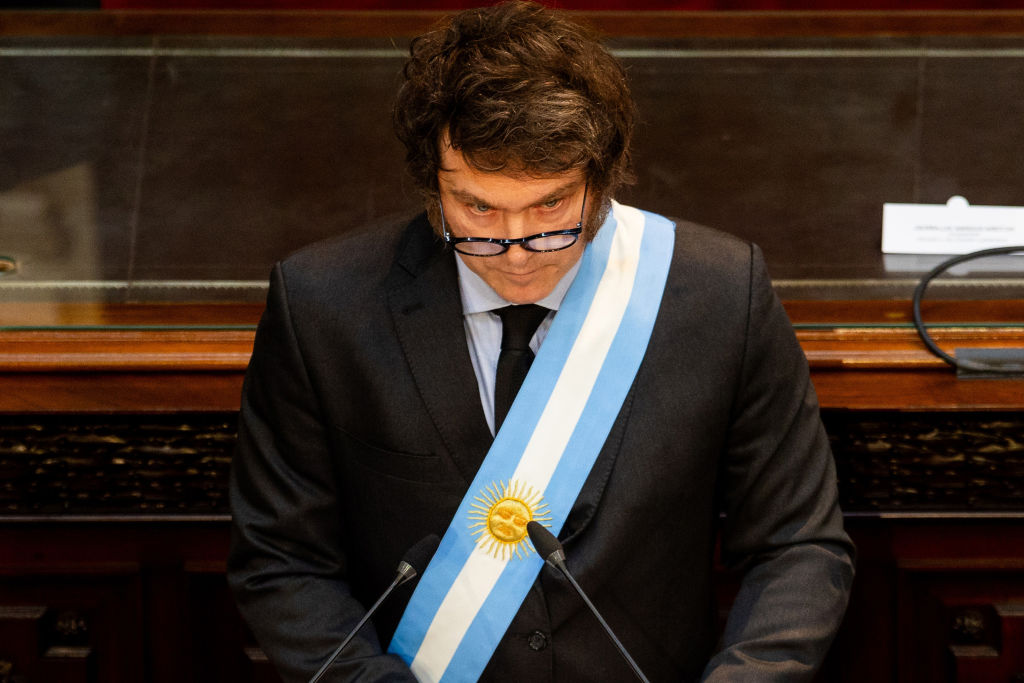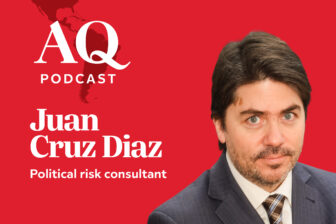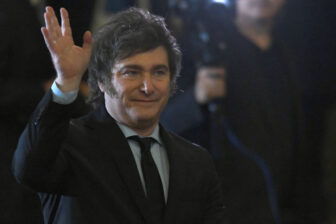BUENOS AIRES — The Javier Milei phenomenon confused everyone. Political parties, the business and intellectual establishments and other powerful sectors—all still struggle to categorize Argentina’s president.
The main concern of investors, local and foreign alike, is whether his ambitious reforms to shift Argentina towards a market economy can move forward. He began with few allies in Congress and elsewhere and now has even fewer, due to his verbal pyrotechnics. Milei’s chances of pushing through his program appear to be diminishing, but a narrow path to success remains open.
Everyone knows that Milei’s main short-term mission is to bring down inflation, currently running at an annual rate of 276%. To that end, his economic program is advancing, but some of its key points—labor reform and economic deregulation, among others—are in doubt because Milei used a presidential decree to put them in place. Efforts to entrench it in law have already been rejected in the Senate and parts of it have been struck down by courts. Its future depends on the Chamber of Deputies, where his La Libertad Avanza party has few representatives.
Milei is hedging his bets: If the Chamber of Deputies rejects it, he has promised to continue his efforts through several decrees dealing separately with each of the issues.
Despite the political noise, and the downturn in living standards Milei always said was unfortunately necessary in the short term, the president’s popularity has been resilient. One poll released this week put approval of his government’s performance at 47.7%, and his disapproval at 47.6%. It was confirmation of an Argentina split down the middle, but also with more consensus than one might expect: Milei remains the most popular politician in the country by a healthy margin.
A president at full throttle
In the continuing effort to understand his philosophy and future, Milei has drawn some comparisons to Donald Trump—but unlike the former U.S. president (and current candidate), Milei does not have a powerful party behind him from which to draw support, and he does not seem to share Trump’s protectionist streak. The two are united in their attempt to communicate directly with sectors of society, bypassing traditional intermediaries; their disregard for institutions; and their emphasis on confrontation over dialogue.
The Biden administration was likely not too pleased by Milei’s choice to speak before a conservative gathering in Washington the day after Secretary of State Antony Blinken’s visit to Argentina. But with few friends in the region, Washington cannot complain too much about the most Western-aligned Argentine president since Carlos Menem, in power from 1989 to 1999.
During his campaign, Milei made a basic promise to defeat inflation, and to do it through dollarization. Inflation has slowly begun to come down—from a 25% monthly rate in December to a still world-beating 13% in February—as Milei has kept hyperinflation at bay for now, and the government achieved a fiscal surplus in January and February based on a strong reduction in pension payouts and an almost total halt of public works.
“Liquidation” is the most common term to refer to the fall in real incomes that has accompanied these developments. The high inflation registered in the last stage of the previous government (211% in 2023) and the strong devaluation of salaries in these three months have increased poverty from 40% to 47% in one year, according to preliminary figures.

Several experts have warned that this fiscal adjustment model is not sustainable and expect Argentina to present a stabilization plan, as it did with the convertibility period of the 1990s. But for now, Milei has only defined the very broad outlines of a plan, which is being carried out by a finance minister, Luis Caputo, whose experience lies more in financial markets than in macroeconomics. Caputo’s strategy has raised eyebrows: to the fiscal and monetary adjustment program, he added a request to executives to lower prices, an idea that resembles the rhetoric of Kirchnerism, although perhaps with better manners.
And Caputo, like his predecessors, has achieved a brake on inflation in part through an exchange rate delay: The official exchange rate devalues only 2% per month, far behind the price index.
How Milei will achieve a more aggressive reduction in inflation remains unclear. It is easier to lower the price level from 25% to 13% per month than to get it to single digits, closer to the regional average.
Dollarization may not be the answer. Aware of the complications that followed dollarization in El Salvador, Panama and Ecuador, Milei seems content to support a mixed model of currency competition between a strong dollar and weak peso.
That’s in part because his prior vision of dollarization did not get support from Washington’s financial institutions, which usually promote floating exchange rate regimes. The IMF has been categorical in private and in public: There are no shortcuts to achieve stability, and Argentina needsto follow other countries’ example, achieve fiscal stability, and have an independent central bank.
The idea of dollarization did not convince Wall Street, either, where investors still seem skeptical after the disillusionment they suffered with the failure of Mauricio Macri’s government (2015-19) to produce desired reforms.
Aware of these doubts, Milei goes full throttle whenever he can, with decrees and bills on taxation, pensions, and economic deregulation. But so far, these initiatives have repeatedly encountered Congressional opposition. His relationship with his own vice-president, Victoria Villarruel, is not very good, either, in line with Argentina’s long tradition of fights between presidents and their vice presidents.
An opposition in disarray
Milei tries to transform political weakness into strength, by publicly denouncing the casta, the political class and the traditional trade union movement, for not wanting to help the people. The curious thing is that, at least in these first months of government, society has been favorable to this slogan, even in the middle and lower sectors punished by the inheritance of Kirchnerism, and above all by the brutal “liquidation” of income suffered since Milei assumed the presidency.
His most stable allies are the legislators in Propuesta Republicana, PRO, the party founded by Macri in 2005. But even they are confused by the president’s comings and goings and are quietly lamenting, as are the U.S. Treasury Department and the IMF, because they do not know how to help the president.
In spite of everything, Milei has the ball in his court, because of the chaos in Peronism, whose leader, Cristina Kirchner, who is in retreat and seems mostly concerned about her numerous court cases. Former economy minister Sergio Massa has reportedly gone into the private sector, and former President Alberto Fernández can hardly play a central role now, since he hardly did so while in office.
The rest of the political arc is not in better conditions. The oldest party in the country, the Unión Cívica Radical, is divided between those who want to join Milei’s right-wing modernizing proposal and those who believe that they have already lost their identity by occupying a similar role in the Macri years.
Milei’s gambit relies on other political forces remaining discredited and the country failing to explode, but his government has struggled to distinguish itself beyond the libertarian rhetoric of its leader. Analysts ask how he can be successful if he does not follow any of the traditional rules for political success—but then again, the same analysts failed to anticipate his 2023 electoral triumph.
Milei is hoping to draw a full house—obtaining a significant decrease in inflation this year, down to a double-digit annual rate in 2025, without having unemployment soar too much due to the opening of the economy. If he achieves it, it will be because Argentina is used to making 180-degree turns in political, economic, and ideological matters every four years, every time it elects its president.
And he also has a chance because Argentina lives on illusions. President Raúl Alfonsín managed to represent the joy of the democratic return in the 1980s after the bloody military dictatorship; Carlos Menem brought economic stability in the 1990s after the hyperinflation, and Néstor Kirchner was able to overcome the power vacuum after the 2001 implosion.
In this game of illusions, Milei bets on being the man who, with simple slogans, will conquer a society hit by inflation and disillusioned by having lost the benefits of its belle epoque that generated so much admiration in other parts of the world a century ago.
__
Kanenguiser is an economic journalist and the author of several books including La Argentina en el Fondo, a book about Argentina’s history with the International Monetary Fund.








